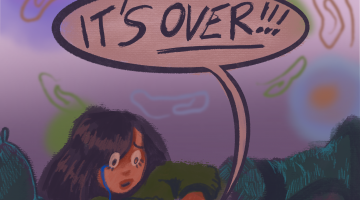It’s that time of year — finals are upon us, classes are minutes from ending and professors are begging students to fill out course evaluations. However, every year, it becomes more apparent course evaluations do absolutely nothing for students or professors.
The problems with course evaluations start with the questions themselves — they’re ineffective and do not actually encourage students to share their experience in the class. We don’t care if the professor met the student learning outcomes set at the beginning of the year. These outcomes are set as a way for administrators to oversee a summary of the class, and asking a student if they were met isn’t helpful because students don’t remember what they are. We don’t sit there throughout the semester checking off the outcomes we learned. Asking if students think the professor has knowledge of the course material is absurd — of course they do, they designed the class. We are not under the impression that we know more than someone with a PhD, and we are there to learn from them. Maybe the way they express their knowledge isn’t effective, but we can all just assume that a professor is knowledgeable about the subject they are teaching — why else would they be hired? Also, asking the student what grade they expect to get undermines the credibility of the evaluation. Someone who nearly failed the class is going to have a different perspective than someone who got an A. Our grades do not matter when it comes to our opinion of the professor and should not be used to give credibility to an evaluation.
Beyond the questions, students don’t even know if the evaluation will be taken seriously. Professors can read these evaluations and still not change their teaching practices — who is there to make sure student suggestions are considered and/or implemented? Students have little faith professors will actually read or absorb any information given during the evaluation, so they don’t bother to fill them out. Professors don’t really have incentives to change their ways, especially if they have tenure and can’t be fired by the university, so filling evaluations out would be a waste of time.
What students really need is an element of transparency when it comes to course evaluations. There isn’t a page on the university website that tells us what the course evaluations are beyond what questions students can expect, and we have questions: what do they do? Who reads them? Does it actually change anything? If these questions were openly answered, students would have more incentive to fill out the evaluations in hopes the classes following theirs can be improved.
Perhaps one of the most burning questions is what happens to the professors — good and bad? If a professor changed a student’s life and inspired their future, and the student writes this in the evaluation, is the professor rewarded, and if so, how? On the flip side, if a professor is absolutely terrible and many students express this in their evaluations, what happens to them? How will the students who previously took the class know they were taken seriously?
We need all these questions and more answered clearly by the university, and we need more transparency. A good solution to this would be a setting up something similar to Rate My Professor at the university. If the university is asking us to submit these evaluations, we and everyone else should be able to see them. It would be helpful for students to see what real students think of their professors. It also would keep the university accountable for actually enforcing rewards and punishments based on the results of the evaluations. This would be a more credible system than students having to rely on a website whose biggest scandal revolved around a chili pepper.
Some professors do take evaluations seriously and change their courses and styles based on the results, but we don’t know who and how many for sure. The students pay too much money to not have our opinions be taken seriously when it comes to who is giving us our education. We need transparency and effectiveness now.
The Editorial Board can be reached at mpurdue@sagebrush.unr.edu and on Twitter @NevadaSagebrush.










